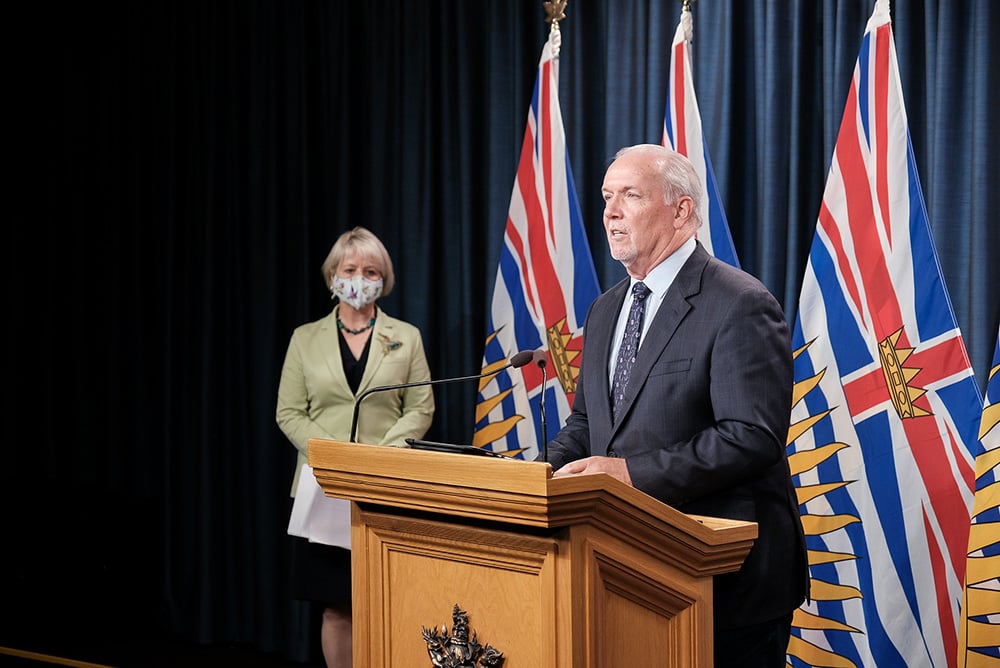British Columbians can now obtain the proof of vaccination they will need to enter restaurants, sporting events, gyms and indoor events like weddings and concerts starting Monday.
Public and essential services like health care, grocery stores and liquor stores are not included in the program. Fast food and cafeteria settings like mall food courts or drive-thrus are also exempt.
Digital and printable vaccination cards are now available online through the vaccine card website and Health Gateway portal, or by phone at 1-833-838-2323.
“Vaccinations have been proven very, very successful at helping us stem the virus’s transmission… but we’re not yet at a point where we can let down our guard,” provincial health officer Dr. Bonnie Henry said Tuesday.
On Monday, Sept. 13, people wishing to enter non-essential venues will need to show their vaccine card — on their phones or on paper — or original immunization record proving they have at least one shot of the vaccine.
By Oct. 24 they will need to show proof of both shots to enter.
Physical vaccine records issued by health authorities can be used until Sept. 27, when only the new vaccine cards will be allowed to prove immunization status.
Out-of-province and international visitors will need to show their local proof of vaccination and photo ID when visiting these venues in B.C.
“This will be that added layer of protection so businesses don’t have clusters and outbreaks and aren’t needed to be closed this fall,” said Henry.
B.C. data shows that unvaccinated people are 12 times as likely to be infected by COVID-19, at 34 times more risk of hospitalization and eight times more likely to die of the virus than people of the same age who are fully vaccinated.
Right now, more than 80 per cent of cases and hospitalizations are among the approximately 20 per cent of the population who are unvaccinated, including children under 12 who are ineligible for either shot.
Health Minister Adrian Dix said “we’re doing exactly what is required to save lives and to save people’s long-term health.”
Despite concerns from more than 25 legal and human rights organizations expressed in a letter last week, there are no exemptions for the small number of people who cannot be vaccinated for medical reasons or who do not have a personal health number and can’t access vaccination.
The letter, signed by Pivot Legal Society and others, urged exemptions for those denied MSP coverage, undocumented people, those without government photo ID or a fixed address due to low income or drug use and people who can’t be vaccinated for medical reasons.
“Sweeping policies that restrict access, however well-intentioned, can have the effect of forcing people into isolation, cutting off their lines of resources, and making their lives even more dangerous during a pandemic,” the letter said.
“This measure fails to account for the diverse needs of people who utilize a variety of public, private and communal spaces who will face legitimate barriers to accessing a vaccine card.”
Henry emphasized that the measure is temporary and intended to address high-risk settings that are important but not essential while the province works on getting more people vaccinated and bringing case numbers down.
Public health officials unveiled the cards on Tuesday morning, which saw the website crash as thousands of people tried to obtain their documentation during its launch.
The website asks for your personal health number, date of birth and date of first or second vaccine dose to generate the vaccine card.
After obtaining it, you can screenshot the card’s scannable QR code to keep on your phone or computer and email a copy to yourself to print out. Both physical and digital copies of the card are accepted as proof, and must be presented with photo ID for all adults over 19.
Cases and hospitalizations in B.C. are expected to continue to climb for the next month and could top 1,000 cases per day in the next few weeks, according to recent modelling presented by the province.
Since the vaccine card program was announced two weeks ago, registrations to be immunized against COVID-19 have tripled and vaccine bookings have doubled.
But hospitalizations continue to rise, particularly in intensive care. They could soon overwhelm the health-care system, independent and provincial modelling warned last week, which is already strained.
“We’ll get the most bang-for-the-buck from having vaccine passports if people get vaccinated as early as possible, both protecting them from severe cases but also reducing transmission to others,” the independent BC COVID-19 Modelling Group said in a Sept. 1 report.
Henry and Health Minister Adrian Dix said the program is already improving vaccination rates, particularly among people 18 to 24, and will ensure more businesses can stay open safely during the fourth wave.
“We will get through this, and this is another tool we have,” said Henry.
The cards are not linked to any other personal or health information, Dix said, and are only scannable using the BC Vaccine Card app which will be available for businesses starting next week. The app only verifies your card, it does not store personal information.
It will also be compatible with other provincial vaccine card programs, as well as the coming federal app to verify vaccine status for international travel.
Horgan, Dix and Henry urged people to respect the public health order and the frontline workers who will be enforcing it.
Individuals who don’t respect the order can be fined up to $575 and organizers or businesses up to $2,300 for failing to comply. ![]()
Read more: Coronavirus, BC Politics
















Tyee Commenting Guidelines
Comments that violate guidelines risk being deleted, and violations may result in a temporary or permanent user ban. Maintain the spirit of good conversation to stay in the discussion.
*Please note The Tyee is not a forum for spreading misinformation about COVID-19, denying its existence or minimizing its risk to public health.
Do:
Do not: